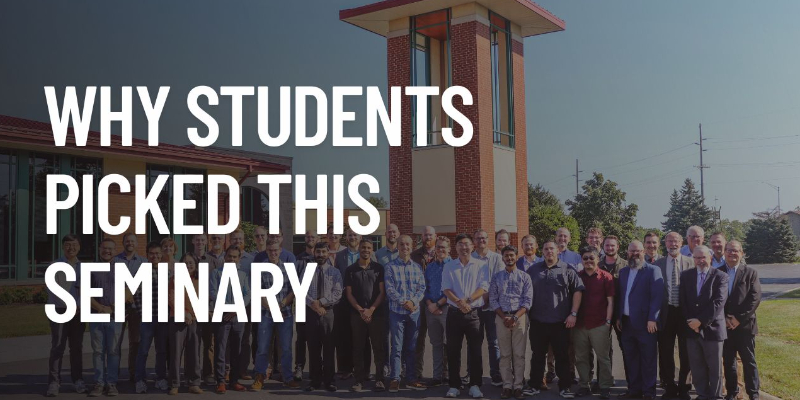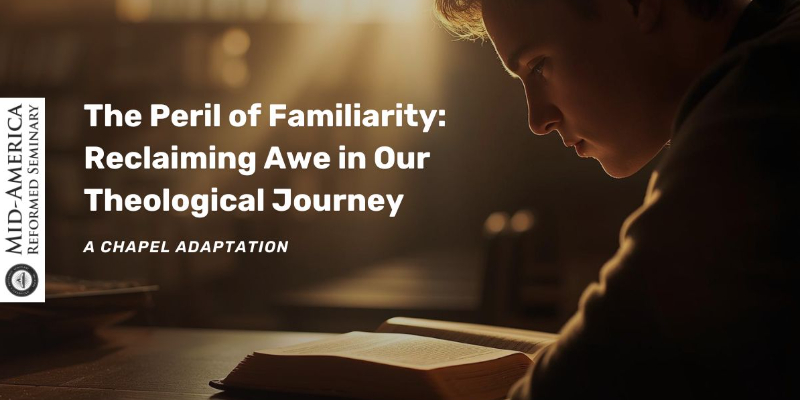
Catechism Preaching: Cherished Legacy, Contemporary Necessity
Catechism Preaching and Mid-America Reformed Seminary
In one of the earliest volumes of the Mid-America Journal of Theology (1985), the late Dr. P.Y. DeJong embarked upon a three-part series of articles on catechetical preaching. Those articles, “Comments on Catechetical Preaching,” presented a compelling case for reviving this historic Reformed practice. Professor DeJong minced no words when he asserted:
“It’s [The Heidelberg Catechism’s] message deserves to be heard again and again from every true Reformed pulpit to call sinners to repentance, to strengthen old and young in the true faith and to glorify God for his saving work for, in and through those who are ordained to life eternal. With that conviction Reformed churches have for centuries mandated that one sermon every Sunday shall ordinarily teach ‘the sum of doctrine contained in the Heidelberg Catechism.’ To minimize, ridicule or openly defy this regulation is for Reformed preachers and people the betrayal of a precious legacy won at so great a cost. It is part of a spiritual birthright which ought never be exchanged for a mess of cheap pottage.”
Nearly 40 years after these remarks were made, Mid-America Reformed Seminary continues to champion the practice of catechism preaching. We do not merely acknowledge its existence or assume that those entering the ministry will somehow learn how to preach the Catechism. Mid-America insists that those aspiring to gospel ministry learn how to preach catechetical sermons. During the spring semester, middler and senior seminarians participated in the Catechism Preaching course taught by professors Venema and Ipema, both of whom enhance classroom instruction with extensive pastoral experience. Students learn the history of catechism preaching, its homiletical justification, and a methodology that will enable them to exegete the Catechism with a view to its exposition and application as a preaching text.
Working in a “teaching lab” environment, students present and defend a sermon outline based upon a chosen section of the Heidelberg Catechism or the Westminster Shorter and Larger Catechisms. Interaction between students and faculty in these exercises sharpens sermonic focus. It challenges each student to wrestle with the Catechism text so that the meaning of the confession is articulated and pastorally applied.
Catechism Preaching: A Practice in Decline?
Sadly, we may be witnessing the demise of catechism preaching among Reformed churches and denominations that once advocated this glorious heritage. There are several reasons for this demise.
First, many Reformed churches, following the trend of many evangelical churches, have dispensed with the second Lord’s day service. This may be due to chronically poor attendance at the second service or as a means of retaining church members who may be tempted to join congregations with only one Lord’s day service. Historically, the second service in Reformed churches functioned as a teaching service devoted to preaching the Catechism. With the elimination of this service, Reformed churches are forced to incorporate the Catechism into the morning worship service or eliminate catechism preaching altogether. The latter seems to be the decision of many of these churches.
Second, there are churches, even in the Reformed tradition, that question the legitimacy of catechism preaching. Some view the Catechism as an outdated relic of a previous era. Others find the Catechism divisive and even hostile in its theological polemics. There are even some who believe that catechism preaching elevates a manmade document to the level of the God-breathed Scriptures, thereby emulating Roman Catholic practices that were judged to be idolatrous by the reformers.
Third (and perhaps closer to home), catechism preaching has fallen upon hard times in our churches due to a lack of uniform training among those entering the ministry in Reformed churches. The URCNA Church Order, for example, stipulates in its “Guidelines for a Reformed Theological Education” that candidates for the ministry should receive instruction in catechism preaching. However, neither the manner of instruction nor the preaching methodology are specified. The result is that some candidates for the ministry have only minimal training in catechism preaching or have chosen a method that shies away from the Catechism as the preaching text.
Fourth, in some Reformed churches that practice catechism preaching, we find examples of pastors called from other confessionally Reformed churches that do not practice catechism preaching nor require candidates for the ministry to learn a catechism preaching methodology while in seminary. Given the expectation or Church Order requirement to preach the Catechism regularly, these pastors scramble to learn how to preach the Catechism or choose to incorporate the Catechism into a sermon based upon a Scripture text.
Biblical and Historical Precedent for Catechism Preaching
The practice of catechetical preaching and teaching reaches back to the earliest days of the apostolic era. The epistles of Paul to Timothy and Titus clearly show this fact. Paul instructs Timothy to administer the ministry of the gospel of Jesus Christ by maintaining “the pattern of sound teaching” (2 Timothy 1:13). Those engaged in gospel preaching are to avoid foolish speculations about myths and genealogies. Instead, they were to guard the good deposit given to the church by preaching and teaching the message of saving grace in Jesus Christ. The result of this kind of faithful catechetical ministry is that Christ would be glorified, and his people would be adorned by sound biblical instruction (Titus 2:10).
In the centuries leading up to the Protestant Reformation, catechetical preaching was closely tied to preparing new converts for membership in the Church of Jesus Christ. Much like the substance of the Heidelberg Catechism, these sermons provided an exposition and application of the Apostles’ Creed, the Ten Commandments, and the Lord’s Prayer. This practice fell into neglect as the sacrament of the mass became the dominant feature of public worship, and superstitious religious practices replaced instruction in sound Christian doctrine.
Despite the progress made by the Protestant reformers in recovering sound biblical teaching, the average Christian believer remained ignorant of biblical truth and in dire need of sound catechetical preaching. With his characteristic bluntness, Martin Luther observed:
“Good God, what wretchedness I beheld! The common people, especially those who live in the country, have no knowledge whatever of Christian teaching. Although the people are supposed to be Christians, are baptized, and receive the holy sacrament, they do not know the Lord’s prayer, the Creed or the Ten Commandments; they live as if they were pigs or irrational beasts, and now that the gospel has been restored they have mastered the fine art of abusing liberty…”
Therefore, it should come as no surprise that the Protestant reformers placed a premium upon preaching that would provide sound instruction in the Christian faith. However, when they made their plea for catechism preaching, they did not envision it as something novel in the church’s history. As with many early controversies with Roman Catholicism, the reformers appealed to Scripture and the practice of the early Church Fathers, who had established a precedent for catechism preaching long before.
When Elector Frederick commissioned the writing of the Heidelberg Catechism, he insisted that it be written so that the people could understand its plain meaning and that preachers could employ it as the basis of their preaching ministry. Protestant leaders came to admire the straightforward, simple elegance of the Heidelberg Catechism.
Heinrich Bullinger, successor to Zwingli in Zürich and himself an author of a catechism, had this to say about the Heidelberg Catechism:
“The order of the book is clear; the matter true, good, and beautiful; the whole is luminous, fruitful, and godly; it comprehends many great truths in a small compass. I believe that no better catechism has ever been issued.”
Objections to Catechism Preaching
From its earliest practice in the Reformation, catechism preaching has come under harsh criticism, even from those who confess its truths. Perhaps the most common and enduring criticism is that catechism preaching substitutes the words of fallible men for the infallible, God-breathed words of Scripture. Regrettably, this criticism fails to consider the nature of the church’s confession as the Word-of-God-summarized. Catechism preaching that takes the catechism as its homiletical text does so out of the conviction that it is a faithful summary of the word of God. Abraham Kuyper pointed this out years ago:
“Our fathers rightly understood that the systematic proclamation of the basic teachings of our confession is only possible when the truth is drawn from not one but from ten or twelve texts and all of these together. Therefore catechetical preaching for them was not no-preaching according to Scripture, but preaching on all these texts deliberately placed under each answer. The enumeration of texts therefore is not incidental but essential. It is not: so also does holy Scripture think about this matter, but: from these and these veins of the Bible this gold has been mined.”
Quite obviously, certain portions of the Heidelberg Catechism quote the Scriptures verbatim. In its treatment of Christian gratitude, for example, the Catechism explains the Ten Commandments and the Lord’s Prayer. It’s difficult to imagine how critics of catechism preaching could fail to see the biblical basis of the Catechism’s teaching. The same critics would do well in this regard to remember the words of the Second Helvetic Confession (1536):
“Wherefore when this Word of God is now preached in the church by preachers lawfully called, we believe that the very Word of God is proclaimed, and received by the faithful; and that neither any other Word of God is to be invented nor is to be expected from heaven: and that now the Word itself which is preached is to be regarded, not the minister that preaches; for even if he be evil and a sinner, nevertheless the Word of God remains still true and good.”
Another common criticism of catechism preaching is that it is dull, dry, and overly intellectual. Any pastor sensitive to the spiritual needs of his congregation will hear in that criticism a plea for preaching that is meaningful, lively, and attentive to the daily struggles of the Christian faith. With its emphasis on personal comfort in Christ, the Heidelberg Catechism naturally lends itself to genuinely pastoral, practical, and personal preaching. While some have criticized the Heidelberg Catechism as overly subjective and man-centered, a careful reading of the text should convince the most ardent critic that the Catechism is not only doctrinal in its content but also doxological in its purpose and catholic in its scope.
Preparing the Next Generation of Catechism Preachers
The legacy of catechism preaching is indeed a treasure that the church should cherish. Do we want to hear strong and vibrant catechism preaching in our churches? Do we desire this for our children and grandchildren? If we do, we will want to ensure that every generation of future preachers receives the kind of ministerial training that will equip them with the skills to preach the Catechism persuasively, passionately, and pastorally. Mid-America Reformed Seminary remains uniquely qualified to fulfill this task of building up Christ’s body for the glory of our Savior.
Rev. Paul Ipema serves as Assistant Professor of Ministerial Studies | Ministerial Apprenticeship Program Director | Dean of Students
Recent articles




